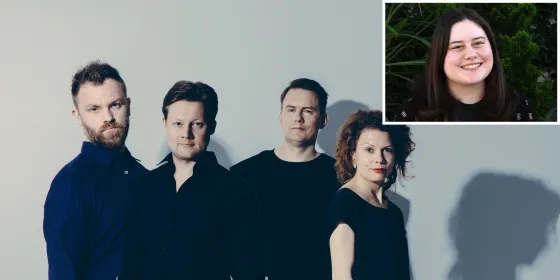TAC Students and Finnish String Quartet Meta4 Fight Climate Change with Music
TAC students premiered new works alongside Meta4, who is managed by Opus3, acquired by the San Francisco Conservatory of Music in 2020.
By Alex Heigl
Climate change is an unfortunate reality of life in the 21st-century. And as with every "new normal," musicians are rising to the challenge of processing this with their art.
In fact, Finnish string quartet and Opus 3 Artists Meta4 made an entire evening out of it with their Friday performance with SFCM students in the Technology and Applied Composition (TAC) program, "Climate (in)Action: A Meta4 + TAC Collaboration."
Compositions by students Caroline Feitosa, Udit Srivathsan and Cullen Luper were programmed alongside forward-thinking contemporary composers like Kaija Saariaho, Krishna Nagaraja and the trailblazing composer Amy Beach, whose "Gaelic" Symphony, premiered by the Boston Symphony Orchestra in 1896, was the first symphony composed and published by an American woman.
"We are well aware of the speed of things happening here in the north, although we are not suffering yet from such radical drought and heat waves as areas south of us are," Meta4 violinist Antti Tikkanen said. "But our flora and fauna are changing: For example the reindeer herders are having a difficult time with keeping their animals well during the winter. So, if these (and other) issues can be held in the minds of people by the means of art, we should do it!"
"When it comes to this program," Tikkanen continued, "nearly every piece in it comes from an area where the nature as it then was has, in one way or another, inspired the composers. The string quartet by Amy Beach, for example, is very much built on indigenous music, especially from the north."
Feitosa, whose composition Business As Usual was performed, explained that while she had written for a string quartet before and a piece about climate change, some time had elapsed since then, and felt slightly daunted by the prompt to create a hybrid piece that incorporated both the quartet and electronic elements.
"I looked up different climate change websites to see how people expressed their different worries about things, and I came across a group of people who put clocks all around the country, with very specific timing—something like, six years, 21 days, three hours, four minutes—which is the point at which Earth will be irreversibly changed by our actions and negligence."
"And there were graphs on the site showing what would happen if we embraced the Green New Deal: It would lower carbon emissions, but if things stayed 'business as usual,' they go up. And I thought, that's such a silly way to word it, so I called my piece Business as Usual."
The piece built on this timely aspect with a ticking motif Feitosa sampled to introduce it, which then builds to a soundscape of manipulated samples and tremolo-bowed strings, with a grandfather clock included as one of the sounds. "This is all to symbolize that we're here, time has run out, these effects are irreversible," Feitosa explained. "But then it transitions back into this beautiful lush sound from the beginning of the piece. I ended up doing some hybrid orchestra stuff with this piece, which I'd never have gotten to do if I hadn't come to SFCM."
Feitosa continued that the piece's cyclical structure is "my way of saying that Earth will survive. It moves in cycles, and it doesn't need us to survive, we need it. It's spent thousands of years without us and will continue to survive without us, but it will always go through this cycle of renewing itself."
A panel discussion and Q&A with Meta4, TAC students, and faculty followed the concert.
Learn more about SFCM's Technology and Applied Composition program.
